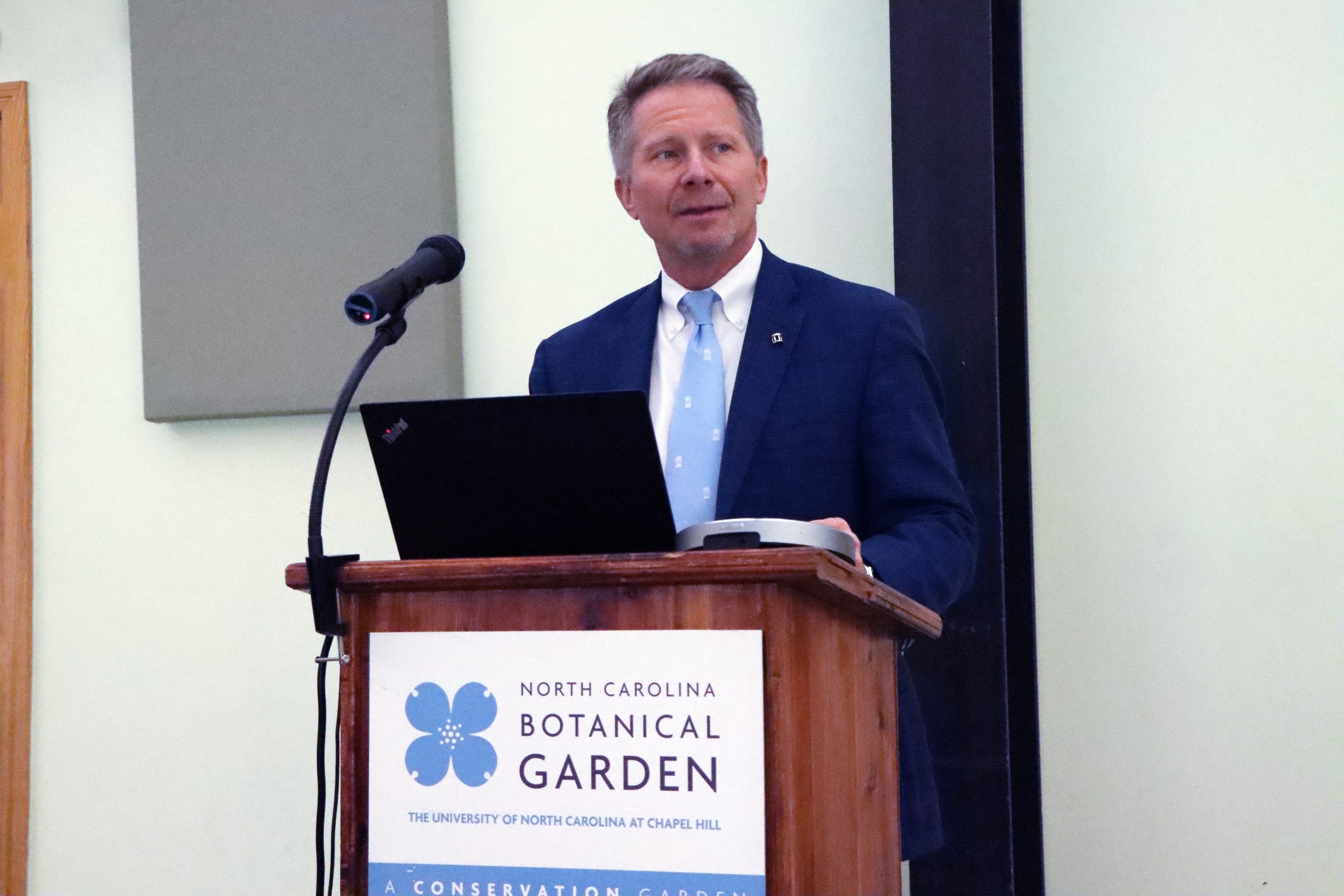by Matthew Smith
The following story discusses suicide, mental health and mental health resources. If you or someone you know needs mental health resources and support, please call, text or chat with the 988 Suicide and Crisis Lifeline.
Several researchers at the University of North Carolina at Chapel Hill are focusing their efforts on suicide-related intervention research, but linking their work across schools and departments can be daunting.

Facilitated by the Department of Psychiatry’s Suicide Prevention Institute, the event sought to break down the barriers that keep researchers from collaborating and help one another connect, share and “be curious.”
“We found that a lot of people at UNC were doing really interesting and important work on suicide, but they did not know that the group next door was doing something important that connected with them,” said Patrick Sullivan, Yeargan Distinguished Professor of Psychiatry and Genetics and director of the institute.
“(We wanted to) hear as many voices as we could to break down the silos that exist right now because collaboration is the key.”
Rising need
The country’s suicide rate hit its highest mark since 1941 last year, rising 35 percent over the last two decades. The New York Times reported that the rate of suicides involving guns in the United States reached its peak in 2023 since officials began tracking it more than 50 years ago.
College students are reporting rising rates of anxiety and depression, so figuring out the best and most effective ways to intervene before, during and after a suicide attempt is vital work.
“Each of us knows someone that has been impacted by the tragedy and trauma of suicide,” UNC Chancellor Kevin M. Guskiewicz said.
“This is a topic I’m deeply passionate about. This is instrumental in continuing our understanding of what is … a crisis across the country. The teamwork embodies Carolina’s culture of collaboration. That’s how we solve the greatest challenges of our times. I’m confident that you’ll rise to this challenge.”
Work across campus
Leading the conversation were UNC faculty, state workers and colleagues from UNC System institutions.
In all, the event included seven feature presentations with more than a dozen presenters giving quick, five-minute “lightning talks.”
Highlights of the presentations included:
- Brian Pence, Department of Epidemiology: Pence discussed his INSPIRE project aimed at establishing a suicide surveillance system in North Carolina and using it to identify intervention points for suicide prevention;
- Dr. Carrie Brown, North Carolina Department of Health and Human Services: Brown shared the efforts of the state’s suicide prevention action plan, including its successes of hiring a state suicide prevention coordinator, establishing school-based 9-8-8 suicide crises programs, and creating and making publicly available suicide data dashboards;
- Avery Cook, Campus Health: Cook highlighted the resources offered campuswide to the UNC community through the Heels Care Network, including mental health training, peer support and care referrals;
- Danielle Roubinov, Department of Psychiatry: Roubinov discussed growing efforts to provide pediatric mental health interventions while partnering with primary care providers to treat youth in short, evidence-based sessions before early adulthood;
- Paul Lanier, School of Social Work: Lanier highlighted the many programs, hubs and centers focusing on behavioral health research and workforce development at the School, including the Youth Mental Health Systems Science Hub, Behavioral Health Workforce Research Center, Behavioral Health Springboard, UNC PrimeCare, and Inclusive TEAMS;
- Sonyia Richardson, UNC Charlotte: Richardson shared her work developing and testing novel interventions aimed at reducing suicide among Black youth and ways she hopes to identify and remove barriers to mental health treatment for racially minoritized populations.
“Initially, I was not exactly sure how I was going to fit in with the Suicide Prevention Institute group,” Lanier said. “But my goodness, this is some serious research. I’ll just say that this has been the most inclusive and welcoming group of people I’ve met at UNC.”
Earlier this year, the state announced an $835 million investment in behavioral health with a plan to increase funding for services for mental health, substance abuse, youth mental health, and strengthening the behavioral health workforce.
“There’s also a sense of urgency; things are very troubling in terms of the issues and data we’re seeing,” Lanier said. “I would also say that in North Carolina we have this amazing window of opportunity — a once-in-a-generation situation here right now — to really make some major changes. It’s exciting to be a part of that.”
Receiving support
The Suicide Prevention Institute was announced in 2022 as part of a $25 million commitment from William and Dana Starling.
Its long-term mission is to provide accessible alternatives to every person in North Carolina who is contemplating suicide while doing its best to ensure that no more families have to face the tragedy of losing a loved one to suicide.
Students, faculty and staff seeking mental health resources can find them through Campus Health’s Heels Care Network. The network provides mental health and well-being resources, including links to 24/7 support, training opportunities and suicide prevention resources. If you or someone you know is in crisis or contemplating suicide, call or text 988 or visit https://988lifeline.org/ for immediate help.
Related stories

Lanier receives $250K Humana Foundation award
UNC School of Social Work Professor Paul Lanier has received a $250,000 award from the Humana Foundation to study the impact of suicide prevention programs.

Governor’s Office invests in youth mental health across 100 N.C. counties
The North Carolina Governor’s Office has made a $4.6 million commitment to a program housed at UNC’s School of Social Work.

